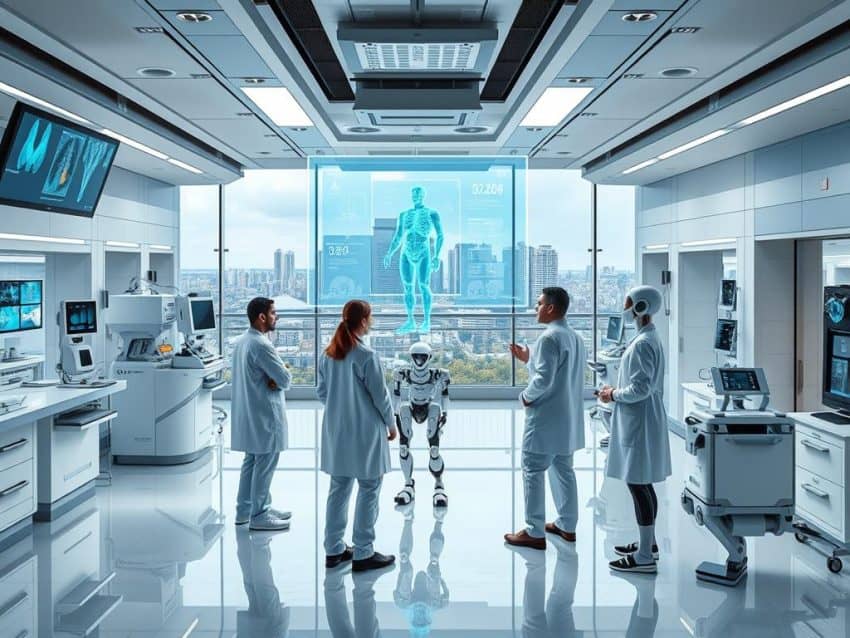Did you know AI systems can spot breast cancer with a 90% sensitivity? This is way better than doctors at 78%. This shows how AI is changing healthcare, making patient care and results better. The AI in healthcare market is expected to grow from $2.4 billion in 2019 to $31.02 billion by 2025. It’s clear AI is here to stay and is a big step forward in medical technology.
AI is making healthcare better in many ways. It helps doctors diagnose diseases better, tailor treatments, and predict risks. These changes help doctors give more precise and efficient healthcare solutions. This makes patient care better and makes healthcare work smoother. AI is changing how we diagnose and care for patients, improving lives.
Key Takeaways
- AI improves the accuracy of disease diagnosis, particuarly in breast cancer.
- Personalized treatment plans lead to better patient outcomes.
- Predictive analytics enable early identification of cardiovascular disease risks.
- Virtual health assistants enhance patient engagement and decision-making.
- AI accelerates drug discovery and clinical trial design.
- AI tools reduce administrative burdens in healthcare settings.
Impact of AI in Healthcare
Artificial Intelligence is changing healthcare in big ways. It helps improve how we diagnose and treat patients. It also makes patient care better and makes healthcare systems work more smoothly.
Improving Diagnostics and Treatment
AI is changing how we diagnose diseases. It can look at lots of data fast and accurately. For example, AI can spot genetic changes linked to diseases like colorectal cancer with up to 93.8% accuracy.
This helps doctors create treatment plans that are just right for each patient. It’s a big step towards making medicine more precise.
Enhancing Patient Engagement
Getting patients involved in their care is key. AI helps with this by using wearables and apps. These tools let patients keep track of their health.
This makes it easier for patients to follow their treatment plans. It also helps doctors and patients talk better. This leads to better health outcomes for everyone.
Streamlining Administrative Workflows
AI is making healthcare’s back office work better too. It automates tasks like filling out medical records. This frees up healthcare workers to focus on what matters most: patient care.
By doing so, AI cuts down on mistakes and speeds up getting payments. This makes healthcare more efficient and effective.

AI in Healthcare: Applications and Technologies
AI has changed healthcare a lot. It uses machine learning and deep learning to help doctors. These tools make diagnosing easier, treatment plans more personal, and patient care better.
Machine Learning and Deep Learning in Medicine
Machine learning helps doctors understand big data. It finds patterns that help in making decisions. Deep learning is great for things like looking at medical images.
For example, AI can spot pneumonia in X-rays better than doctors. It can also tell if a skin lesion is cancerous. The FDA has approved an AI for diabetic retinopathy detection, showing how good it is.
Natural Language Processing for Improved Communication
Natural language processing makes talking between patients and doctors better. AI tools can understand medical texts and summarize talks. This gives doctors insights into how patients feel and how they’re doing.
IBM’s Watson is one tool that helps doctors make better choices. Virtual assistants and chatbots are also changing primary care. They help patients figure out what’s wrong and what to do next.
Conclusion
The future of AI in healthcare is both exciting and transformative. It promises to bring about enhanced accuracy and personalized treatment plans. This could greatly improve patient outcomes.
Yet, we must understand the challenges of AI implementation. We need to tackle issues like data privacy and model interpretability. These are key to successfully integrating AI into healthcare.
As we advance, we must not overlook the ethical considerations in healthcare AI. We need to address regulatory and safety challenges. This ensures AI is used responsibly and safely.
By working together, human clinicians and AI systems can shape a sustainable future. The evolution of machine learning and natural language processing in healthcare is clear. Our path forward must be one of cooperation.
Embracing these technologies while being mindful of their implications will lead us to a better future. This is essential for the healthcare industry.
